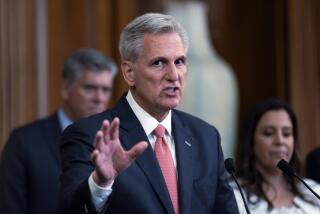Dannemeyer on Panetta
- Share via
On Dec. 9, you published a puff piece on my colleague in the House of Representatives, Leon E. Panetta (named to be director of management and budget in the Clinton Administration). I serve on the Budget Committee in the House with Panetta. Panetta may talk about reducing the deficit; the problem with him is he doesn’t vote the way he talks.
During the last 10 years I have been the author of at least eight budget resolutions which gave Panetta a chance to vote for lower spending and reduce the deficit. He voted against every one.
You get three guesses who led the Democratic opposition to the constitutional amendment calling for a balanced budget, which came to a vote last June. The first two don’t count, for it was Leon Panetta.
Sara Fritz was modest in her article saying that Panetta played a key role in the budget summit agreement of 1990. Panetta was the House architect of the agreement, which was a total failure in its objectives. The five-year project deficit was not reduced from $1 trillion to $500 billion--it has exploded to $1.3 trillion. New taxes of $175 billion over five years were supposed to bring in more revenue to the federal government. In fact revenues have declined because the agreement reducing taxes aggravated the recession just under way in October, 1990. This totally discredited agreement was supposed to reduce base-line spending levels by $325 billion over five years. The projections are that spending levels will be $179.8 billion higher, a total error of over $500 billion.
Judge members of Congress by how we vote, not on what we say. Based on this criteria, Panetta has not voted to restrain runaway spending to match his rhetoric.
The liberal dominated media have adopted a policy of trying to convince voters that Democratic President-elect Clinton, Panetta and Sen. Lloyd Bentsen are leopards who have changed their spots and will move away from the spend-and-elect liberal Democrat policies. I predict that taxes will be raised on the middle class, and the new revenue will not go to reduce the deficit but will finance additional federal spending. Additions to the national debt of over $400 billion per year will continue until it takes all the income from personal income taxes to pay the interest on the debt, about 1996, rather than about 60% currently.
This rush to national bankruptcy will continue until the public decide to change who controls the place where the spending originates, namely, the U.S. Congress.
REP. WILLIAM E. DANNEMEYER
R-Fullerton
More to Read
Get the L.A. Times Politics newsletter
Deeply reported insights into legislation, politics and policy from Sacramento, Washington and beyond. In your inbox twice per week.
You may occasionally receive promotional content from the Los Angeles Times.










